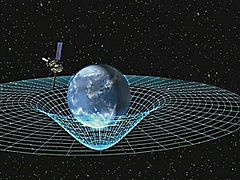| Part of a series on |
| Spacetime |
|---|
 |
There are many ways to derive the Lorentz transformations using a variety of physical principles, ranging from Maxwell's equations to Einstein's postulates of special relativity, and mathematical tools, spanning from elementary algebra and hyperbolic functions, to linear algebra and group theory.
This article provides a few of the easier ones to follow in the context of special relativity, for the simplest case of a Lorentz boost in standard configuration, i.e. two inertial frames moving relative to each other at constant (uniform) relative velocity less than the speed of light, and using Cartesian coordinates so that the x and x′ axes are collinear.
